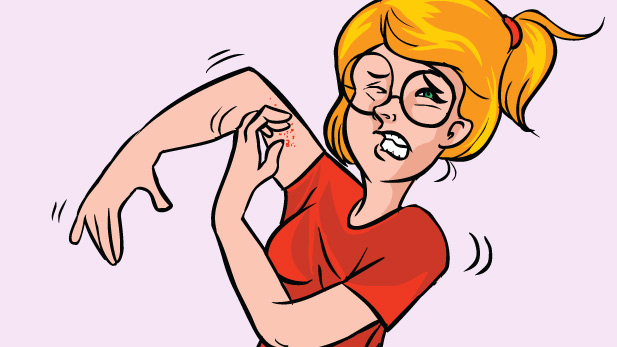What causes an itch on your body?

What causes an itch on your body?
Itchiness, this feeling comes from your brain. When a mosquito bites us, or poison ivy touches our skin, our skin releases chemicals that cause irritation. So there must be itch receptors in our skin that passes the information of itchiness to the spinal cord, and the spinal cord passes this information on to our brain. There are so many reasons behind itchiness including dryness, diseases or an allergic reaction. Common culprits that are responsible are poison ivy, a mosquito, fess, bugs, caterpillars or even strands of hair touching your face. Certain skin conditions such as eczema or psoriasis also cause itching.
We have all experienced the inconvenience of the annoying itch. But have you ever wondered why we do so? There are so many random causes that bring about itching which makes it quite a mysterious phenomenon. And it is!
The most common cause of itch that probably everyone has experienced at some point of time in their life is that caused by a mosquito bite.
Last week I went for a hike in the woods. I saw a lot of pretty things like lots of wild flowers, lots of birds and lots if pretty rocks, but I only brought one thing bank with me, LOTS of mosquito bites. Depending upon where you live and what time of the year it is, if you spend a lot of time outside you’ve probably been bitten by mosquitoes too. And long after the mosquitoes are gone, you are left with red itching bumps.
Contents
So what is it that causes us to itch when we get bitten by a mosquito?
You should know that it is only the female mosquitoes that bite. They will jab your skin with a needle like extension protruding from their head called a proboscis. The mosquito uses this proboscis like a straw to take a sip of blood from the blood vessels right beneath your skin. While doing so, the mosquito releases a certain chemical from its own body to help her to do the job. After the mosquito stings your skin and buzzes off it leaves a tiny bit of this chemical known as an anticoagulant into your body. This foreign chemical will alert your body’s immune system. The primary job of your body’s immune system is to protect it from invaders like the anticoagulant. The immune system is what keeps you from falling sick every often. It attacks almost anything that it doesn’t recognise including any harmful viruses or bacteria that may have entered your body. Now our body is only slightly allergic to the anticoagulant but it still lets the immune system know. The immune system in turn tries to heal the bite by sending some special fluid known as histamine to the area around it. The histamine increases the blood flow to that area and causes your capillaries to swell. This swelling creates a bump. This bump triggers the nerves around them and they carry the message to your brain that makes you want to scratch.
When we scratch, the action of our nails on the skin causes a low level pain signal that overrides the itching sensation. This mild distraction overrides the itching sensation thus providing relief for a short period of time.
But scratching is also not good. It will only harm your skin. Because when you scratch it irritates the bump even more and your body tries even harder to stop whatever is bothering it.
Is itching contagious?
Studies have shown that watching someone itch activates the same parts of the brain that makes you scratch yourself. Researchers once conducted a research to study the behaviour of people subjected to talks and visualisations of itching. The audience were not previously informed about the motive behind this session. The researchers noticed that the audience got to scratching with both verbal and visual itch cues.
Is itching the result of an evolution?
Scientists say that over the years our skin has equipped itself to deal with risks from the outside world. So what started of as a way for our ancestors to get dangerous insects off their bodies eons ago, has now turned into a frustrating sensation that we have to deal with.
Cause of itching
An itch can be caused by several reasons including dryness, diseases or an allergic reaction. And then there is the mysterious itch that pops up out of nowhere. There are several common culprits that are responsible for causing an itch such as poison ivy, a mosquito, fess, bugs, caterpillars or even strands of hair touching your face. Certain skin conditions such as eczema or psoriasis also causes itching. It can also be brought on by assumingly unrelated things such as brain tumour, diabetes and chemotherapy.
There is also a psychological condition called Delusory Parasitosis that makes people believe that their body is infested with mites or fleas scurrying over and under their skin making them itch excessively.
Keep the hand away
Even though scratching may be extremely tempting, don’t scratch away! There is a certain type of nerve cells known as C-fiber that can detect hear, itching as well as pain. As mentioned previously, it’s true that scratching stops the itch but you are stimulating the touch as well as the pain receptors in the same area. Excessive scratching can tear your skin so keep your palms away! It could cause a wound on your skin or cause an infection or even lead to scarring.
The best way to stop the itching is by placing a pack of ice over the area or using a paste made from baking soda and water.






Responses